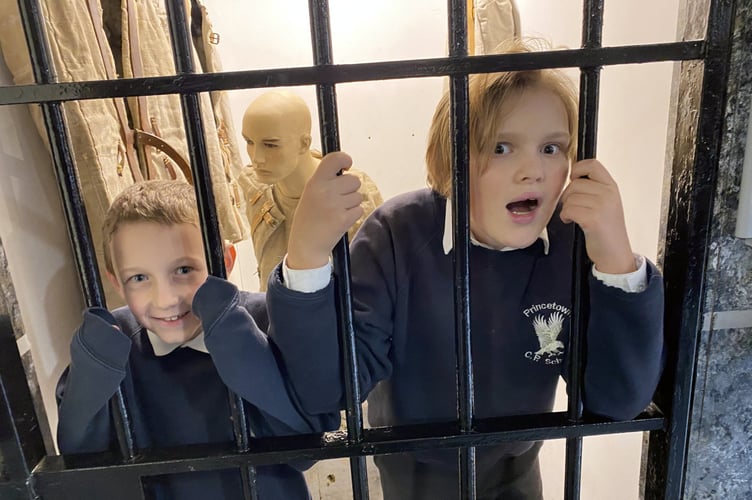A GROUP of children were sent behind bars to get a taste of life in prison.
The Princetown School children learned about day-to-day routine, punishments, food, escaping and what it felt like to be in a prison cell.
The visit to Dartmoor Prison Museum was part of the children’s lessons in crime and punishment. They also came to see pieces of work they had completed at school on the walls of the museum as an exhibition for the public to see.
Each pupil has written about a specific era of history and illustrated the essays with pictures about the laws, imprisonment, policing, infamous criminals and crimes.
Laura Taverner, Key Stage 2 teacher, took the group of excited children: “They love coming to the museum. They’ve been learning all about crime and punishment through history, as the prison is on our doorstep it makes sense to bring them here. The museum is the nearest we’re going to get to seeing inside a prison. The punishment and committing crimes really interests them and the museum brings their studies alive.
“We’ve started a really good relationship with the museum to support the children’s learning. The children are really pleased to see their work on the walls, where all the visitors can see it. It’s a credit to them, they worked really hard and have produced some insightful work that shows their understanding of the subject.
“Henry and Fletcher are happy to be shut in the cell, but they’re not locked in. However, Callum and Jess aren’t keen and I don’t blame them at all. It’s very atmospheric here in the basement with two recreated cells with mannequin copies of prisoners inside.
“They’re particulalrly interested to learn about when a law was passed banning the execution of children as a sentence for committing crimes. It might seem a long time ago to children, but it’s still in the 20th century, which is really shocking.”
Callum, eight, studied the Anglo Saxons. He said: “People who murdered someone were branded on their bodies with a letter M. They had a trail by fire which is when they had to hold a very hot iron bar and if they were burned they were guilty of a crime. There was no police force, people were caught by other people.” Henry, enjoyed writing about the Romans.
“There wasn’t a police force, but there were vigilantes who caught people who did bad things. The Romans did a lot to discourage criminals.
“The Roman guards dealt with people if the vigilantes could not. People were flogged if they stole things and sent into exile if they burgled homes. And if you didn’t worship the emperor you were put to death or sent to fight the gladiators and killed. Or if you sold underweight bread, you were whipped.”
Fletcher said: “I learned how the Victorians punished criminals. They made them pick oakham, which is old rope, and then send the bits back to Devonport Naval Base to stop the ships sinking. Children were punished in the same way as grown-ups.”





Comments
This article has no comments yet. Be the first to leave a comment.